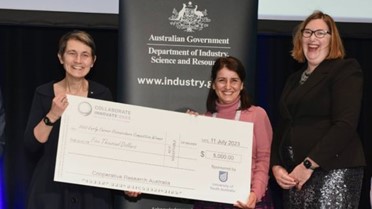Research aims to help people with trauma improve their sleep

Sponsored by

Sponsored by

A study looking at sleep problems and trauma symptoms in people affected by bushfires has won a Federation researcher the Early Career Researcher award at the Cooperative Research Australia conference.
Fadia Isaac, a practising clinical psychologist for almost 14 years, is doing her PhD research on the topic and running a clinical intervention to help people with sleep disorders and trauma symptoms stemming from bushfires.
The project started with Ms Isaac participating in a study that looked at the existing research on the subject.
"Our international survey last year looked at bushfires in Australia, Canada and the US, and we found 49 per cent of bushfire survivors had difficulty with sleep and 78 per cent had trauma symptoms – not PTSD (post-traumatic stress disorder) – but trauma symptoms," Ms Isaac said.
"Clinical work and research tell us that if we can successfully treat sleep disorders, we're very likely to eliminate the possibility of these symptoms progressing to PTSD or other mental health issues.
"We're trying to catch sleep difficulties very early so we can prevent the progression of these symptoms into becoming something more sinister and more difficult to treat."
Following the publication of that study, Ms Isaac took a collection of research ideas to her supervisor Professor Gerard Kennedy who backed a proposal that was later awarded a scholarship from Natural Hazards Research Australia.
Her study included producing a series of video modules featuring animations and actors to role-play the therapeutic sessions.
The intervention is using a cognitive behavioural therapy approach.
Ms Isaac says people don't have to be directly exposed to bushfires to develop sleep difficulties and trauma symptoms, with some suffering from smoke inhalation and other indirect consequences.
"We are trying to change people's cognition about sleep. Some people think that they need to sleep 10 hours to be able to function, but it's often not possible to get 10 hours," Ms Isaac said.
"People can still function when they are tired, so these cognitions can definitely affect their ability to feel motivated during the day, and that can breed more anxiety that will continue to act like a vicious cycle for people. The first thing we look at is correcting these unhelpful thoughts."
The second component of the intervention is changing people's behaviours. Ms Isaac says some people who struggle to sleep will self-medicate or drink alcohol, believing that will help them get a good night's rest.
"But this is counterproductive because people who drink alcohol may be able to sleep better initially, but they will wake up in the middle of the night feeling dehydrated and cannot go back to sleep," she said.
"We look to implement good sleep hygiene for people, telling them to brush their teeth, wash their face, putting pyjamas on an hour before bed, switching the lights off so they can get the melatonin kicking in for better sleep."
Ms Isaac says using actors in the modules to role-play the therapeutic sessions shows participants what they need to do and puts the theory into action.

"One of the things that will often come up for people who have been through trauma is that they develop nightmares. We get them to rewrite their nightmares in a more benign way, getting them to change the end of the nightmare or the beginning of the nightmare and once they have that script and they are happy with it, they get to rehearse the new dream during their waking hours," she said.
"The brain is more likely to remember that benign dream than the nightmare, so this is how they can shift that nightmare from being such a bad experience.
"Many people have a lot of fear and are afraid of going to bed because of the nightmare, but if they are more likely to remember the new dream they have written for themselves, they will look forward to sleeping and not being burdened by their nightmares."
The program takes four weeks to complete, with participants in the intervention and control groups given Fitbits as part of the trial to track sleep patterns during the first week before the intervention begins.
A second group of participants – the control group – has a four-week wait period before receiving the same treatment as an intervention group.
Ms Isaacs has also been running workshops on sleep and improving sleep in bushfire-affected areas, a program that has helped recruit some participants into the study who may have otherwise felt reluctant to get involved.
"There is very limited research in this area, and it's probably under-researched because people don't think sleep problems are the underlying issue when they present for treatment," she said.
"They just often think sleep isn't a major contributor to their difficulties, but that's not often the case."
